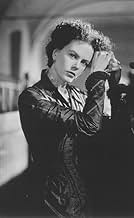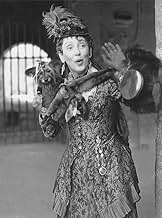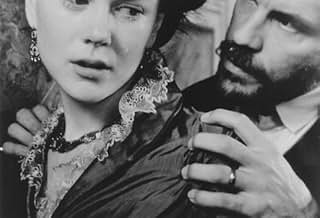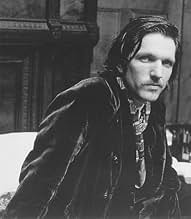VALUTAZIONE IMDb
6,2/10
13.308
LA TUA VALUTAZIONE
Una ragazza americana eredita una fortuna e finisce in una relazione sbagliata con un finto gentiluomo la cui vera natura, inclusa un'indole spinata e avida, trasforma la sua vita in un incu... Leggi tuttoUna ragazza americana eredita una fortuna e finisce in una relazione sbagliata con un finto gentiluomo la cui vera natura, inclusa un'indole spinata e avida, trasforma la sua vita in un incubo.Una ragazza americana eredita una fortuna e finisce in una relazione sbagliata con un finto gentiluomo la cui vera natura, inclusa un'indole spinata e avida, trasforma la sua vita in un incubo.
- Candidato a 2 Oscar
- 5 vittorie e 15 candidature totali
Amy Lindsay
- Miss Molyneux #1
- (as Katie Campbell)
Recensioni in evidenza
I rented this to get a look at Viggo Mortensen in some of his "other" films. He was beautiful to look at, but probably miscast. The whole movie stumped me. The sets and costumes were sumptuous (I frankly found the sets more interesting to look at than the characters). But this is more a character study than a plot-driven story; the characters should captivate us (or at least interest us) and allow us to come away with an understanding of them. This part failed, for me. Nicole Kidman and John Malkovich seemed to be in a Stone-Faced Acting contest, with Malkovich's monotonous drone matched only by Nicole's insistence on using one solitary facial expression for every "emotion" she supposedly felt. The woman only smiled once, near the end with ill cousin Ralph. What on earth made all these men fall in love with her, and not only fall, but STAY, in Goodwood's case for YEARS? I figured she would be independent and feisty, at least until she allowed herself to fall under Osmond's sway, but... she seemed cold and repressed from the very beginning.
I tried very hard to understand this woman, and at times I could - but only drawing from personal experience, not through anything Kidman offered. And what's up with that ending?? Some people here seemed to get it, but I was left shaking my head, what, that's the last scene?? Oh well, I got to look at Viggo every once in awhile, so it wasn't a total loss.
I tried very hard to understand this woman, and at times I could - but only drawing from personal experience, not through anything Kidman offered. And what's up with that ending?? Some people here seemed to get it, but I was left shaking my head, what, that's the last scene?? Oh well, I got to look at Viggo every once in awhile, so it wasn't a total loss.
An interesting film with an undercurrent of sexual repression similar to that in Campion's other films. Nicole Kidman is excellent, given the material, though her transition from likeable, virtuous innocent to a cold and corrupted woman doesn't ring as true as it should--the three years glossed over with a subtitle isn't adequate to show the change. I blame this on the interpretation, direction, and/or editing rather than Kidman's performance, however. Malkovich is not as strong, and one wonders what any woman could see in him as a lover.
The ending is cold and unsettling. Most filmgoers prefer to know that their hero/heroine is "safe" at the end of the story. Here, who knows ?
Production values are good, and the film is quite stylish with interesting use of camera tilt, lighting, and angles. It's quite artsy. I am glad I saw the film, but acknowledge it's not likely to be everyone's cup of tea.
The ending is cold and unsettling. Most filmgoers prefer to know that their hero/heroine is "safe" at the end of the story. Here, who knows ?
Production values are good, and the film is quite stylish with interesting use of camera tilt, lighting, and angles. It's quite artsy. I am glad I saw the film, but acknowledge it's not likely to be everyone's cup of tea.
I vacillate between preferring films that do a simple thing extremely well (Muppet Movie) or those that shoot high and fail. This film is the latter.
Campion has allied her aspirations with `women's' perspectives; honorable and rich enough. And she selects material ripe with possibilities. Clearly she has a vision, presumably extracted from the author's, but she fails to get on top of it.
Part of the problem is the simplification of the book for the screenplay. We just don't get enough foundation for the travesty of person we witness. A large part of the problem is Ms Kidman. She simply doesn't have the depth to pull this off, though she wears the clothes well. We never really see her supposed extraordinary spirit, and never really see how she's trapped by that very same spirit. Malkovich doesn't help. Here, he's too one-dimensionally a schemer.
Campion knows better than to throw in so many irrelevant film-school angles as a substitute for narrative reflection. This film is worth seeing as a study in how a spirited film maker is seduced by that very spirit into the superficialities of style, so is trapped. The ambiguous ending is, I think, Campion's limbo. Let's hope she escapes for her sake as well as ours. We need that spirit.
Campion has allied her aspirations with `women's' perspectives; honorable and rich enough. And she selects material ripe with possibilities. Clearly she has a vision, presumably extracted from the author's, but she fails to get on top of it.
Part of the problem is the simplification of the book for the screenplay. We just don't get enough foundation for the travesty of person we witness. A large part of the problem is Ms Kidman. She simply doesn't have the depth to pull this off, though she wears the clothes well. We never really see her supposed extraordinary spirit, and never really see how she's trapped by that very same spirit. Malkovich doesn't help. Here, he's too one-dimensionally a schemer.
Campion knows better than to throw in so many irrelevant film-school angles as a substitute for narrative reflection. This film is worth seeing as a study in how a spirited film maker is seduced by that very spirit into the superficialities of style, so is trapped. The ambiguous ending is, I think, Campion's limbo. Let's hope she escapes for her sake as well as ours. We need that spirit.
How can Henry James' novella "Turn Of The Screw" swallow me in whole while I find his other work wordy and arrogant? And how can the same director that has made the two most boring movies I have ever seen, "Two Friends" and this one, also be the same person behind "Sweetie" and "Holy Smoke" - the two finest examples of a movie drawing real characters in real places I have ever seen? This film left me in a state of semi-paralysis.
Being a fan of slow-paced, foreign, and period piece movies, I was pretty surprised at how much this movie bored me. I'm writing this review to try to sort out my feelings of bewilderment.
I think one problem is the use of John Malkovich. We've seen him soar to great heights in the paradoxical "Being John Malkovich" and "The Glass Menagerie", but here his monotone is overly droll and predictable, almost as if he is playing off himself in a Saturday Night Live sketch. In fact the most enjoyable part of this movie was the scene where Mr. Malkovich twirls the umbrella in an ambiguously literal attempt to hypnotize Isabel. If only there were more of these elements in the film....
Then there's Nicole Kidman, whose underachieving attempts at acting has managed to ruin films by not one but two of the greats: Ms. Campion and Stanley Kubrick. Her delivery was similar to Gwyneth Paltrow's in "Mr. Ripley" -- obviously lost. She's just another pretty face thrown into a role of substance after receiving excessive amounts of hype. Watching them act gives me the same feeling I get watching the members of Milli Vanilli try to sing. In their element, they can be undeniably sexy or cute, but in deeper roles the viewer is left completely clueless to their characters' motives. Is Isabel supposed to be docile, alluring, witty, in-control, charismatic, or not-in-control? We can't tell.
In this mess, Barbara Hershey and Martin Donovan as the sickly cousin were both very good. But alongside the weak link Kidman there was little they could do. And Campion made some extremely unusual stylistic sidetracks, the very sidetracks that work in the Holy Smoke India scenes. But in a period piece the fading dream suitors, inexplicable intro, and Chaplin filters seemed inappropriate, although one has to admire her for trying. Even when I don't agree with her methods I respect her sense of adventure (but let's face it, I'll love her forever because of Sweetie). With a little more humility from Campion, a different Isabel, and a more invigorated Malkovich this film might have worked.
For a good treatment of James, try to scare up a copy of the 1961 film The Innocents.
Being a fan of slow-paced, foreign, and period piece movies, I was pretty surprised at how much this movie bored me. I'm writing this review to try to sort out my feelings of bewilderment.
I think one problem is the use of John Malkovich. We've seen him soar to great heights in the paradoxical "Being John Malkovich" and "The Glass Menagerie", but here his monotone is overly droll and predictable, almost as if he is playing off himself in a Saturday Night Live sketch. In fact the most enjoyable part of this movie was the scene where Mr. Malkovich twirls the umbrella in an ambiguously literal attempt to hypnotize Isabel. If only there were more of these elements in the film....
Then there's Nicole Kidman, whose underachieving attempts at acting has managed to ruin films by not one but two of the greats: Ms. Campion and Stanley Kubrick. Her delivery was similar to Gwyneth Paltrow's in "Mr. Ripley" -- obviously lost. She's just another pretty face thrown into a role of substance after receiving excessive amounts of hype. Watching them act gives me the same feeling I get watching the members of Milli Vanilli try to sing. In their element, they can be undeniably sexy or cute, but in deeper roles the viewer is left completely clueless to their characters' motives. Is Isabel supposed to be docile, alluring, witty, in-control, charismatic, or not-in-control? We can't tell.
In this mess, Barbara Hershey and Martin Donovan as the sickly cousin were both very good. But alongside the weak link Kidman there was little they could do. And Campion made some extremely unusual stylistic sidetracks, the very sidetracks that work in the Holy Smoke India scenes. But in a period piece the fading dream suitors, inexplicable intro, and Chaplin filters seemed inappropriate, although one has to admire her for trying. Even when I don't agree with her methods I respect her sense of adventure (but let's face it, I'll love her forever because of Sweetie). With a little more humility from Campion, a different Isabel, and a more invigorated Malkovich this film might have worked.
For a good treatment of James, try to scare up a copy of the 1961 film The Innocents.
Henry James's "The Portrait of a Lady" stands as one of the greatest psychodramas in literature, a precise and coolheaded dissection of the evolution of a privileged, idealistic if slightly arrogant young woman. This work exemplifies so many qualities which distinguish his view of human nature; he is compassionate, empathetic and observant yet unyielding in exposing the follies, bad judgement and darkness inherent is his characters. No one, especially Isabel Archer, is let off the hook for their misguided choices and her fate is tragic yet completely plausible and, as laid out by James, completely compelling.
A lost opportunity is the best way to describe the film. It is interestingly photographed, full of greys, blues and whites and suggests an almost funereal solemnity in its production design and cinematography. And Nicole Kidman makes a perfect, iridescent Isabel Archer; she looks the part in every respect and certainly conveys the character's intelligence and poignant receptivity to the sights and people around her.
Would that the film had served her better; Jane Campion and the scriptwriter, Laura Jones, eviscerate James's novel but retaining the basic story and structure but put it through the meatgrinder of 90s feminist revisionism. It has been transmogrified into a simplistic tract of victimization and domestic violence, but in doing so Campion and Jones haven't managed to at least raise the story's entertainment value or even create a coherent narrative line for the audience to follow. Rather than present Isabel as a poignant, charismatic figure who unwittingly corrupts her life through bad choices and misguided idealism, the writer and director show us a woman who is victimized by a big bad Man who keeps her locked up in the house, abuses her and steals her money upon duping her into an unhappy marriage. In doing so, James's great work has been drained of its universality and dramatic impact. And while sexual exploitation and gender roles certainly play a part in sealing Isabel's fate in 19th century society, by ignoring the trenchant thematic notions of self determination and the risks of emotional idealism presented by James in his book, we are given a shallow, one-dimensional creation lacking in James's acid edge. Campion cheats a modern audience of discovering filmically a great and still-relevant work by a writer who dared to travel down the darker alleys of a more "civilized" age.
A lost opportunity is the best way to describe the film. It is interestingly photographed, full of greys, blues and whites and suggests an almost funereal solemnity in its production design and cinematography. And Nicole Kidman makes a perfect, iridescent Isabel Archer; she looks the part in every respect and certainly conveys the character's intelligence and poignant receptivity to the sights and people around her.
Would that the film had served her better; Jane Campion and the scriptwriter, Laura Jones, eviscerate James's novel but retaining the basic story and structure but put it through the meatgrinder of 90s feminist revisionism. It has been transmogrified into a simplistic tract of victimization and domestic violence, but in doing so Campion and Jones haven't managed to at least raise the story's entertainment value or even create a coherent narrative line for the audience to follow. Rather than present Isabel as a poignant, charismatic figure who unwittingly corrupts her life through bad choices and misguided idealism, the writer and director show us a woman who is victimized by a big bad Man who keeps her locked up in the house, abuses her and steals her money upon duping her into an unhappy marriage. In doing so, James's great work has been drained of its universality and dramatic impact. And while sexual exploitation and gender roles certainly play a part in sealing Isabel's fate in 19th century society, by ignoring the trenchant thematic notions of self determination and the risks of emotional idealism presented by James in his book, we are given a shallow, one-dimensional creation lacking in James's acid edge. Campion cheats a modern audience of discovering filmically a great and still-relevant work by a writer who dared to travel down the darker alleys of a more "civilized" age.
Lo sapevi?
- QuizFirst collaboration between director Dame Jane Campion and Nicole Kidman. However, it was Campion who discovered Kidman, where she, at the age of fourteen, was performing at Australian Theater for Young People and subsequently caught the eye of Campion.
- Blooper(at around 47 mins) A horse carriage is passing through the shot from right to left. The crew with dolly-cam and equipment is clearly visible.
- Citazioni
Ralph Touchett: I love you but without hope.
- Curiosità sui creditiJane Campion thanks her family, Colin, Alice and Richard, for their generous support, suggestions and encouragement during the making of this film.
- Colonne sonoreImpromptu in A Flat Major, Op 90 No. 4, D899
(1828)
Composed by Franz Schubert
Adapted for screen by Brian Lock
Performed by Jean-Yves Thibaudet (as Jean Yves Thibaudet)
Courtesy of Decca Records Company Ltd.
I più visti
Accedi per valutare e creare un elenco di titoli salvati per ottenere consigli personalizzati
- How long is The Portrait of a Lady?Powered by Alexa
Dettagli
- Data di uscita
- Paesi di origine
- Lingue
- Celebre anche come
- The Portrait of a Lady
- Luoghi delle riprese
- Palazzo Pfanner, Lucca, Tuscany, Italia(Osmond's palace in Florence)
- Aziende produttrici
- Vedi altri crediti dell’azienda su IMDbPro
Botteghino
- Lordo Stati Uniti e Canada
- 3.692.836 USD
- Fine settimana di apertura Stati Uniti e Canada
- 107.819 USD
- 29 dic 1996
- Lordo in tutto il mondo
- 3.692.836 USD
- Tempo di esecuzione
- 2h 24min(144 min)
- Colore
- Mix di suoni
- Proporzioni
- 2.35 : 1
Contribuisci a questa pagina
Suggerisci una modifica o aggiungi i contenuti mancanti




































